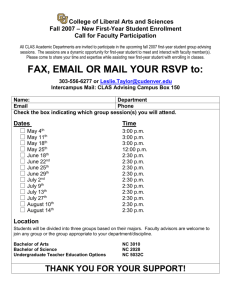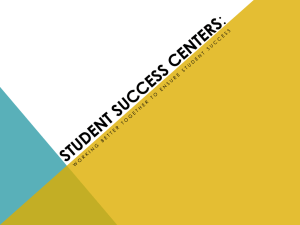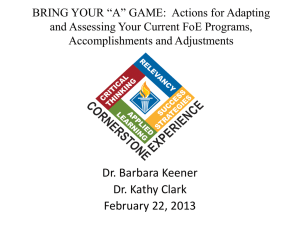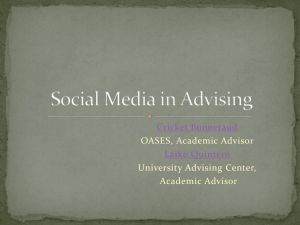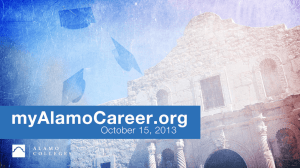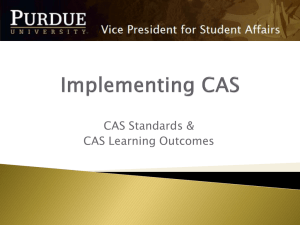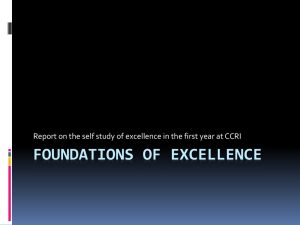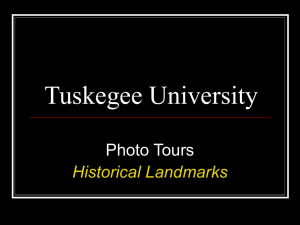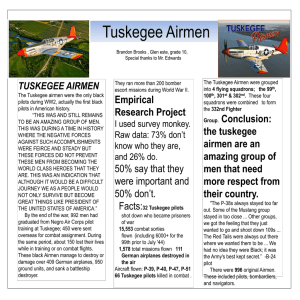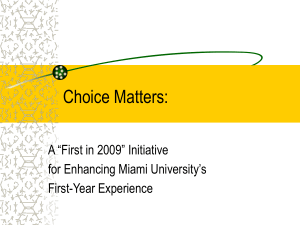Pathway to Academic Success – Tuskegee University 2013
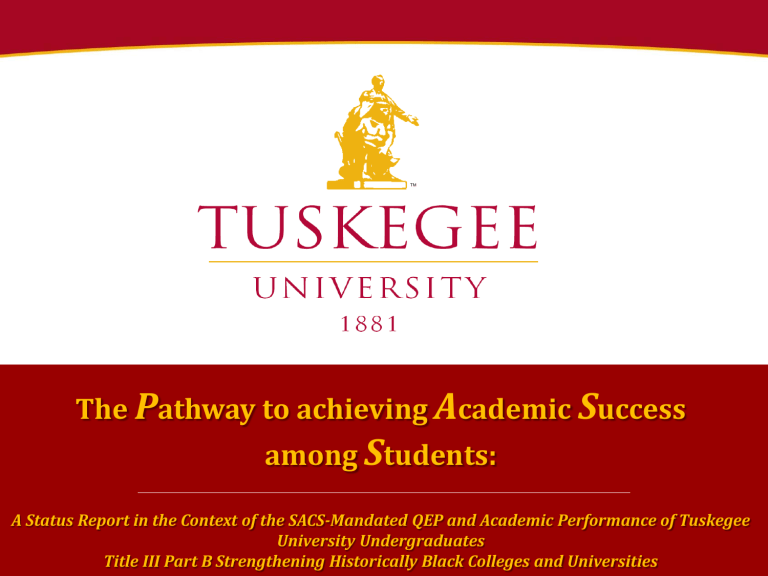
TM
The
P
athway to achieving
A
cademic
S
uccess among
S
tudents:
A Status Report in the Context of the SACS-Mandated QEP and Academic Performance of Tuskegee
University Undergraduates
Title III Part B Strengthening Historically Black Colleges and Universities
Organization Structure
University College
Faculty Instructional
Support
Faculty Center for
Teaching and
Learning
Academic Advising
General Education
Curriculum
T-CAEIL
Academic Enrichment
Ad-hoc Activities
First-Year Intensives
First-Year Orientation
Activities
First-Year Seminar
ASSESSMENTS
SACS mandated QEP (2008-2013)
Humanities
14 hrs.
Natural
Sciences/Mathematics
13 hrs.
Competencies
• Communications
• Mathematical and
Quantitative Reasoning
• Historical Analysis
• Political and Social
Understanding
• Scientific Knowledge
• Computational, Informational, and Technological Skills
• Problem Solving
General
Education
Curriculum
Social/Behavioral
Sciences
12 hrs.
Mission
To promote quality learning outcomes of the general education curriculum
ACADEMIC ENRICHMENT ACTIVITIES
TUSKEGEE CENTER FOR ACADEMIC
EXCELLENCE AND INNOVATIVE LEARNING
(T-CAEIL)
Tuskegee-Center for Academic Excellence (T-CAEIL)
Competencies (2 of 8)
• Communications
• Mathematical and
Quantitative
Reasoning
Academic Enrichment
Courses
• English Composition
• Pre-Calculus
• General Chemistry
• General Physics
• General Biology
Top Ten (10) Majors of Clients Served
1. Biology
2. Undecided
3. Animal and
Poultry Science
4. Mechanical
Engineering
5. Electrical
Engineering
6. Pre-Occupational
Therapy
7. Pre-Nursing
8. Aerospace Science
Engineering
9. Business
Administration
10.Psychology
Students will:
T-CAEIL/QEP OUTCOMES
The overall expected outcomes for students utilizing T-CAEIL services are measurable increases in:
• Course completion rates
• Achievement of competency in mathematical and quantitative reasoning and communication skills
• First-year students’ overall academic performance
• Successful matriculation within academic colleges and programs
• Students continuing matriculation with financial aid assistance (scholarships, loans, etc.)
• Academic performance on standardized testing (EPE, CAAP, GRE, etc.)
• Retention and graduation rates
T-CAEIL Clients
A total of 1352 students have registered and served as clients utilizing T-CAEIL activities and services since 2010. The largest clientele accounts for freshmen. Overall, a total of 10,323 visits were made to T-CAEIL during this time-frame.
The contributing factors for the decreased number of clients for 2012 fall may include: T-CAEIL is no longer open on weekends and additional ad-hoc tutorials are offered within the campus community for Math 107/108. Additional data analysis should be conducted to provide information as it relates to ad-hoc tutorials and online tutorials.
Usage of
The 24/7 tutorials were used for courses: English Composition, Pre-
Calculus, Calculus, General Chemistry, Biology, and Physics.
Pilot Project efforts for 2012-2013 AY
Fall 2012
Assessment were given per semester to identify the students needs for academic enrichment. Students were prescribed modules to assist in improving those skills as it relates to communications and mathematical and quantitative reasoning.
Pilot Project efforts for 2012-2013 AY
Spring 2013
Assessments taken by students enrolled in courses per semester to identify the students’ needs for academic enrichment. Students were prescribed modules to assist in improving those skills as it relates to communications and mathematical and quantitative reasoning.
Pilot Project efforts for 2012-2013 AY
2012 FALL COURSE PERFORMANCE: Non-clients vs. clients
PF= Pass Rate AB= A and B grades
Grades
ABC= A, B, and C
First-Year Intensives
ACADEMIC ADVISING
LASER WEEK
STARFISH RETENTION SOFTWARE
FRESHMAN SEMINAR/FOUNDATION FOR COLLEGE SUCCESS
ADDITIONAL EXTENDED LEARNING/TUTORIAL SERVICES
FIRST-YEAR INTENSIVES
1. Implementation of Email/Blackboard/Starfish Policy to ensure sufficient and uniform communication and transmission of all official related business that bear on teaching and learning.
2. Modification of Freshman Seminar renamed Foundation for College
Success (FCS) with emphasis on communication and mathematical/quantitative reasoning. A blended-delivery teaching approach to include the utilization of Blackboard technology.
3.
Special workshop entitled “Do Your P.A.R.T” for all rising Sophomores enrolled in 19 sections of the FCS course. (Pre-Academic Advising and
Pre-Registration Tips).
4. Reactivation of ACAV 105 – Academic Advising “course” – used to disseminate specific academic advising and general information pertinent to the success of students as Freshman, Sophomores and beyond.
5. Appreciative Advising Training of Faculty Advisors (including self-pace training)
6. Students advised of Required engagement in tutorial services of 100/200 level courses ( T-CAEIL; Luther Foster Hall; CAENS; Graduate for Sure )
FIRST-YEAR INTENSIVES
7. Implementation of Starfish Retention Software which monitors variables that signal less than productive student engagement in the teaching and learning process.
8. Analysis and distribution of midterm grades and end of AY CGPA data to
College/School Deans and Department Heads.
9. Conduct In-House Academic Advising Workshops for all College/Schools.
Emphasis on the utilization of the Appreciative Advising model.
10. Ongoing communication with key offices and/or student support services area critical to academic success and ultimate University-wide retention efforts. Ex. Referrals to Counseling Center.
11. An academic centric-focused LASER WEEK.
INSTRUCTIONAL SUPPORT
TUSKEGEE UNIVERSITY FACULTY CENTER FOR TEACHING AND LEARNING
(TUFCTL)
MISSION STATEMENT
The Tuskegee University Faculty Center for Teaching and Learning is the university’s nucleus for improving the quality of the educational experience, by encouraging faculty creativity, innovation, and continual improvement in instruction. The TUFCTL seeks to address all academic units and programs in an overall effort to ensure that Tuskegee University becomes a national model of excellence in teaching and learning. The TUFCTL accomplishes this by supporting new innovations in teaching; assisting faculty with the implementation of instructional enhancements; collaborating with academic units in recognizing excellence in teaching; providing faculty professional development through workshops, intensives, and other venues; and conducting applied research bearing on pedagogy, the utility of learning technologies and student learning modalities.
INSTRUCTIONAL SUPPORT
TUFCTL ORGANIZATIONAL CHART
DIRECTOR
Executive
Secretary/Office
Administrator
Teaching & Learning
Technology
Videoconferences/
Webinars
Curriculum
Development
Production/Media
Applied
Research
Studentcentered
Pedagogy eLearning/
Blackboard
Training
Professional
Development
Intensives
Seminars/
Workshops
New Faculty
Orientation
INSTRUCTIONAL SUPPORT
Tuskegee University
Faculty Center for Teaching & Learning
Announces
Its Third Professional Development Intensive Workshop
“Using Learning Sciences to Inform Teaching in STEM”
Facilitated by
Jere Confrey, Ph.D.
Chief Mathematics Officer, Amplify Learning
Joseph D. Moore Professor of Mathematics Education
The Friday Institute for Educational Innovation
North Carolina State University
Tuskegee University
Session 1: Foundations of the Learning Sciences: Learning to Listen
April 29, 2013 from 9:00 a.m. – 12:00 p.m.
Session 2: Rethinking Content in Light of Student Interactions
April 29, 2013 from 1:30 p.m. – 4:30 p.m.
Session 3: Implications for Curriculum and Assessment
April 30, 2013 from 9:00 a.m.
– 12:00 p.m.
John A. Kenney Hall, Room 70-420
*
Baseline
ASSESSMENT OF STUDENT LEARNING
IMPACT OF PASS – DURATION OF QEP
AY 2008
*
– 2013
First Year Students
Primary Areas of Focus
Core Competencies
Communications
Mathematics and Quantitative
Reasoning (MQR)
Courses
English Composition
Biology
Chemistry
Physics
Pre-Calculus
Other
Academic Years Examined
2008 | 2009 | 2010 | 2011 | 2012
Overall Pass Rates
SEM/
YEAR
Fall/2008
Fall/2009
Fall/2010
Fall/2011
Fall/2012
MATH
107
67%
68%
76%
79%
85%
ENGLISH
101
90%
93%
93%
89%
93%
CHEMISTRY
231
76%
74%
85%
84%
95%
HISTORY
103
89%
74%
90%
89%
86%
BIOLOGY
111
84%
92%
74%
84%
91%
First-Year Retention Rates
CGPA Distribution
Figure 1: CGPA Distribution among Class of 2015 who ended FA11 with GPAs between
3.95 and 1.87
CGPA Distribution
Figure 2: CGPA Distribution among Class of 2015 who ended FA11 with a GPA of 4.0
T-CAEIL Three-Year Comparison
AY
2008-2009
2009-2010
2010-2011
2011-2012
2012-2013
ACADEMIC ACTIONS by YEAR
Probation Suspension
215 120
190
165
192
130
116
46
50
61
Dismissal
36
22
Total
371
328
211
242
191
*Reduction in Academic Failures by Academic Year
CONCLUSIONS
• 1. Tuskegee University implemented a series of programs under the anchorage of the Title III Part B Strengthening Historically Black Colleges and Universities grant for the five year period beginning Fall, 2008. The focus was primarily for the 1 st year cohorts, incidentally the impact of these programs assisted in a positive academic performance for the total undergraduate enterprise.
•2. As per the QEP objectives, excellent progress has been realized(e.g., pass rate for general education courses, first year retention rate, exemplary academic performance by the class of 2015- year 4 of the QEP-, and – based the aforementioned, projected improvement in the overall CGPAs and six year graduation rate).
•3. All the elements of the University College has been shown to evidence individual utility as well as contributive value in an aggregate and highly synergistic undergraduate teaching and learning construct.
•4. Informed by the outcomes for academic years 1 through 4, the extant undertakings are intended to render academic year 5 the most consequential one as regards student academic performance.
•5. Clearly, the combined impacts of the early alert system, extensive academic advising, improved classroom instructions occasioned through focused in situ faculty professional development intensives, the T-CAEIL – provided extended learning (tutorials), the additional mathematics tutorials held four evenings per
CONCLUSIONS
week and the required tutorial sessions for all student who have failing exam results have occasioned these quite laudatory first year student learning outcomes.
Classroom instructions have not only improved, in some instances the effort is transformative.
To reiterate specific examples:
•a. of the 709 first year students who entered the University in the Fall of 2012, 33% earned academic honors status (GPAs of 3.25 to 4.00) and for the same semester,
86% passed all courses (a result that places Tuskegee University among the nation’s most productive institutions);
•b. remarkably, the first year retention rate has increased from 57% (in 2008) to
77% (in 2012-2013) and corresponding retention rates for second year students have increased from 38% to 64%, respectively; and
•c. such noteworthy student academic achievements are not limited to first and second year students: i) the 2012 education majors (graduates) had a 100% pass rate on the certifications examinations; ii) retention of veterinary medicine students is better than 95% and pass rate on the veterinary medicine licensing examination is 90%; and iii) the nursing program realized a 100% pass rate on the nursing licensing examination.
ACKNOWLEDGEMENTS
• Luther S. Williams, Executive Vice President and Provost
• David Banks – Assistant Prof. – Curriculum & Instruction
• Elaine Bromfield – Director for Academic Advising
• Sherry King – Director for T-CAEIL
• Jeanette Moss-Smith – Title III Coordinator
• Gregory Pritchett – Director for University College & TUFCTL
• Sharon Samuel – Institutional Analysis
• Earnell Seay – Director of first year programs
